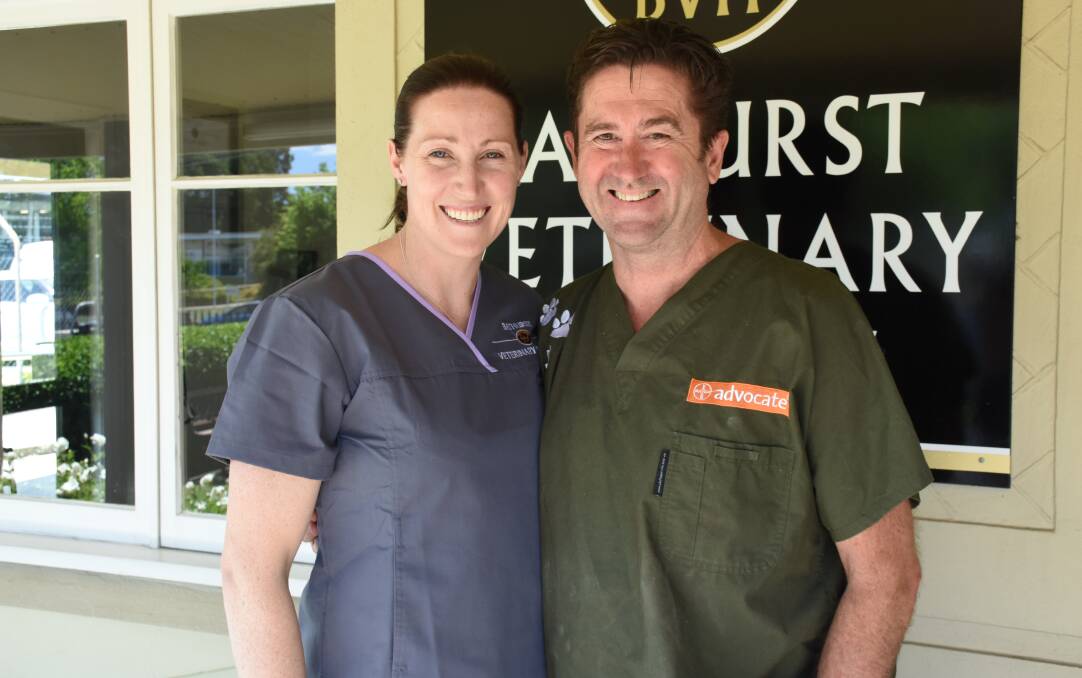
MOTHER, author, speaker, former Olympian and future doctor, Jana Pittman, has paid a visit to Bathurst to help further her medical career.
Subscribe now for unlimited access.
$0/
(min cost $0)
or signup to continue reading
The 34-year old is a two-time world champion in the 400 metres hurdles, she has twice won gold at the Commonwealth Games and now she is studying medicine.
And, this week she paid a visit to a long-time friend and vet at Bathurst Veterinary Hospital, Dr Stephen Van Mil, to observe as he conducts a number of animal surgeries.
“Coming down and watching what Steve’s doing will just give me an idea around the anatomy and how tissues work, because it’s the same tissues and veins and vessels in animals and humans. They feel the same,” she said.
During her visit, Ms Pittman will observe a number of dogs being desexed and other minor surgeries.
Sport was never on the cards, it was always something surgical … I think I just fell into sport.
The former Olympian said even as a child a surgical career was something she had always hoped to pursue.
“Sport was never on the cards, it was always something surgical … I think I just fell into sport,” she said.
“When you’re good at something you get the praise for it. I became good at it very early, I went to my first Olympics when I was 16, that just became my career.”
However, like many of her fellow athletes Ms Pittman said there comes a time when your body can no longer compete at an elite level.
“Unfortunately our bodies don’t stay on the same platform forever,” she said.
“You have to retire, literally in the prime of your life, you’re done athletically.”
Sport and medical disciplines
And now, midway through her medical degree, Ms Pittman said many of the disciplines she had as an athlete have transferred over to her medical career.
“In terms of communication, you’ve had a bit of background in the ups and downs in how things just get thrown at you,” she said.
Ms Pittman said the disciplines, drive and work ethics she adopted during her sporting career have helped her achieve results during her medical degree.
And, she already has her sights firmly set on the next goal – to be a gynaecological surgeon.
I’d love to be an amazing gynaecological surgeon … I’d really love to save women’s lives.
In the past she was diagnosed with CIN 3 dysplasia following a pap smear, and she has since become a passionate voice for women’s health.
“I’d love to be an amazing gynaecological surgeon … I’d really love to save women’s lives,” she said.
“There’s too many women dying from cancer these days, gynaecological cancers.
“I actually really love being able to have the mix between surgery and patient care.”
Uterus transplants
So passionate is she that Ms Pittman has just returned to Australia following an invitation to observe a uterus transplant program in Sweden.
“It’s a new fertility treatment, but it’s obviously in clinical trials at the moment, it’s not a therapeutic option for women at the moment,” she said.
“There are a large cohort of women that either have cancer and have to have a hysterectomy, so their uterus taken out, or they’re actually born without one and they don’t have the option of having children.
Ms Pittman has just returned to Australia following an invitation to observe a uterus transplant program in Sweden.
“This operation has been working in Sweden, they’ve had eight live babies from the operation. Brazil’s got a pregnancy and there’s 15 other countries around the world are now starting the trial.
“Hopefully in the next 10 years in might be an option in Australia.”
And, this was the reason behind her visit to Bathurst Veterinary Hospital, to see hysterectomies being performed.
Going to Nepal and Bhutan
In December next year Ms Pittman and Dr Van Mill will go to Nepal and Bhutan on placement during a cervical screening program.
“The Australian Cervical Cancer Foundation is going over and we’re going to film a documentary about the high rates of cervical cancer in the developing world, and how easily we can reduce those rates with the Gardasil vaccination and also learning how to do site biopsies,” she said.
“[We’ll be] teaching the locals to look at someone’s cervix and be able to know whether they need to get treatment.”
The future
Sport may not have been her dream when she was young, but Ms Pittman acknowledged it has greatly assisted her medical career.
“I feel like my whole sports career has given me the opportunity to have a voice in medicine,” she said.
“I had a lot of ups and downs with the media over the years, but what it has done is given me a very large profile so therefore I’m able to talk about quirky and below the belt things like vaginas and people are like ‘oh it’s Jana, she’s controversial, she can talk about whatever she wants’.”
Oh it’s Jana, she’s controversial, she can talk about whatever she wants.
Ms Pittman said many women do not want to talk about cervical cancer screening, while others do not undertake regular tests.
“They’re all presenting too late to have effective treatment so if we can break that stigma around those kind of cancers then we can make a real difference,” she said.


